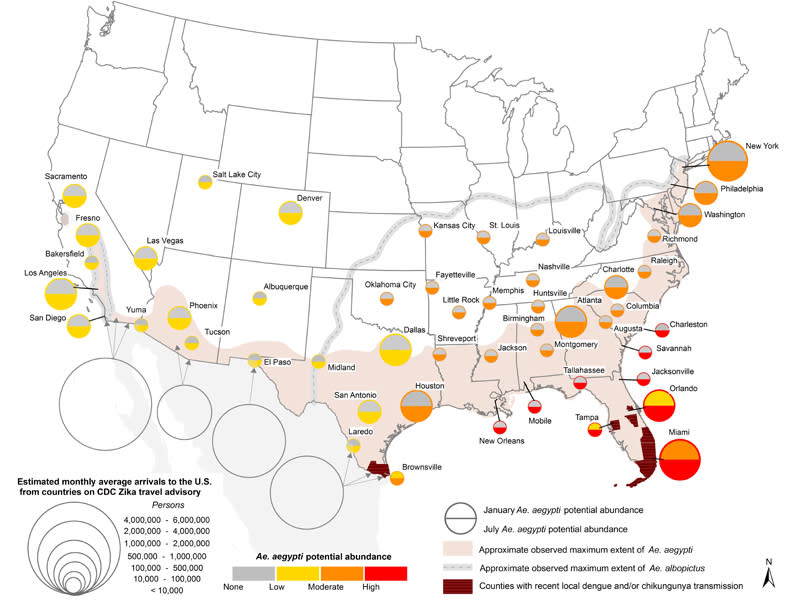U.S. Reports First Zika-Related Death in Puerto Rico as NASA Predicts the Virus's Potential Spread
Health officials have announced the first death linked to the Zika virus has occurred in Puerto Rico.
The U.S. Centers for Disease Control and Prevention reported Friday that a Puerto Rican man in his 70s died from internal bleeding related to a rare immune reaction to the Zika virus infection in late February.
The reaction, called immune thrombocytopenic purpura (ITP), has caused three deaths among people infected with Zika in Colombia, one death in Suriname and four deaths during French Polynesia's 2013-2014 Zika outbreak, reports the Washington Post.
"Although Zika virus-associated deaths are rare, the first identified death in Puerto Rico highlights the possibility of severe cases, as well as the need for continued outreach to raise health care providers' awareness of complications that might lead to severe disease or death," the CDC said.
Puerto Rico, a U.S. territory, has facing a widespread Zika outbreak for several months. The CDC reported that there were 683 lab-confirmed current or recent cases of Zika virus between November 1 and April 15. At least 65 of those cases occurred in pregnant women. A total of 17 of those patients required hospitalization, 5 of whom were suspected to have Guillain-Barré syndrome. – a severe neurological disorder that causes temporary paralysis.
Zika virus infections have been confirmed to cause microcephaly and other birth defects. Earlier this month, U.S. health authorities admitted that the disease is "scarier than we initially thought." While the CDC has advised pregnant women against travel to affected areas for months, the virus has spread throughout the United States.
According to the most recent figures released by the CDC, 436 Zika cases have been reported in the 50 U.S. states and another 596 cases have been confirmed in U.S. territories (this number is at this point low as 683 cases were confirmed by Puerto Rico Friday).
Research suggests that the mosquito that carries the Zika virus will likely increase in number across much of the southern and eastern United States in the coming summer months.

A new series of maps produced by NASA and the National Center for Atmospheric Research and published in the journal PLOS Current Outbreaks show predictions of where outbreaks may occur based off of factors temperature, rainfall and poverty levels. Researchers then broke down risks for each month of the year.
The team found that summer weather conditions could lead to increased populations of the mosquito along the East Coast as far north as New York City and in the south as far west as Los Angeles. The cities researches found to show the highest potential risk include: Miami, Jacksonville, Tampa, Orlando and Tallahassee, Florida; Savannah, Georgia; Mobile, Alabama; and New Orleans, Louisiana.

Researchers hope that identifying high-risk areas will allow health organizations and government agencies to better prepare for potential outbreaks.
"The results generally confirmed many of our suspicions about the relative risk of Zika virus transmission in the U.S.," said Cory Morin a NASA postdoctoral program fellow. "Knowledge is one of the most effective barriers to disease transmission and can alleviate unnecessary concern."
"By identifying the key risk factors and producing forecasts of disease transmission, we can enable citizens canto take effective actions that will greatly reduce their risk of disease," he continued.

